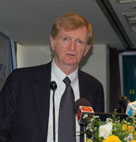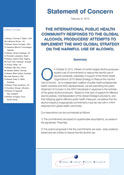Global public health community issues warning over alcohol industry conflict of interest
More than 500 public health professionals, health scientists and NGO representatives from 60 countries have signed a joint Statement of Concern about the activities of the global alcohol producers.
The Statement, sent to WHO Director General Dr Margaret Chan today, raises concerns about the conflict of interest between multinational alcohol companies and public health policies designed to tackle alcohol harm.
The more than 500 signatories include academics, health professionals, and NGO representatives working in areas related to alcohol prevention, treatment and control. They argue that ‘unhealthy commodity industries’, such as the global alcohol producers, should have no role in the formation of national and international public health policies.
This Statement was drawn up in response to public announcements made in October 2012 by 13 of the world’s leading alcohol producers, outlining their commitments to implementing the WHO Global Alcohol Strategy.
 Professor Thomas Babor (Picture left), from the University of Connecticut School of Medicine, USA, led the drafting of the Statement, which was written by a group of international experts under the auspices of the Global Alcohol Policy Alliance. He commented:
Professor Thomas Babor (Picture left), from the University of Connecticut School of Medicine, USA, led the drafting of the Statement, which was written by a group of international experts under the auspices of the Global Alcohol Policy Alliance. He commented:
“Based on their lack of support for effective alcohol policies, misinterpretation of the Global Strategy’s provisions, and their lobbying against effective public health measures, we believe that the alcohol industry’s inappropriate commitments must be met with a united response from global health community.”
“This statement raises an important health issue, namely the undue interference of vested interests in the development of health promotion policies, nationally and globally”, says FORUT’s Secretary General, Morten Lønstad (picture right) in a comment. “This is a concern shared by many health advocates, which is shown by the fact that so many experts have signed the statement after only a few days.
 Through our collaboration with NGO partners and governments in the global South, FORUT regularly witnesses how alcohol producing companies deliberately tries to prevent the development of efficient and evidence-based alcohol policies. They are obviously concerned with the risk of reduced profits. Our concern is the the costs that these industry actions have in terms of increased health and social problems among poor ad underprivileged people”, says Morten Lønstad.
Through our collaboration with NGO partners and governments in the global South, FORUT regularly witnesses how alcohol producing companies deliberately tries to prevent the development of efficient and evidence-based alcohol policies. They are obviously concerned with the risk of reduced profits. Our concern is the the costs that these industry actions have in terms of increased health and social problems among poor ad underprivileged people”, says Morten Lønstad.
Alcohol remains the third leading cause of death and disability worldwide and is a major contributor to the global burden of disease. This Statement highlights how, despite claims to be supportive of reducing harms caused by worldwide, the global alcohol producers actually pose a threat to effective alcohol policies due to their inherent conflict of interest between profits and public health.
The statement points out that the global alcohol producers have misinterpreted their roles and responsibilities with respect to the implementation of the WHO Global Strategy. In one document prepared by the industry sponsored International Centre for Alcohol Policy (ICAP), it is stated that “the adoption of the WHO Global Strategy…has legitimated industry’s ongoing efforts and has opened the door to the inclusion of producers as equal stakeholders.” This is a very biased version of the way the producers are mentioned in the Global Strategy, says FORUT Senior Advisor Øystein Bakke (picture left), who was involved in drafting the Statement. He also followed closely the WHO process leading up to the adoption of the Global Strategy.
 He points out that nothing in the Global Strategy would explain the industry’s involvement in the development of national policies for governments in Africa and Asia, using the WHO Global Strategy as a reason to promote industry-favorable policies without the participation of the WHO or the public health community.
He points out that nothing in the Global Strategy would explain the industry’s involvement in the development of national policies for governments in Africa and Asia, using the WHO Global Strategy as a reason to promote industry-favorable policies without the participation of the WHO or the public health community.
“In one case, national policies were formulated at meetings sponsored by ICAP to fit the specific needs of four different African countries. These plans were found to be virtually identical, with all documents originating from the MS Word document of a senior executive of SABMiller, one of the ICAP’s funders. Subsequent to the publication of this analysis, one of ICAP’s chief consultants was sanctioned by his employer, the government of South Australia, for misrepresenting his government affiliation in the drafting of these reports”.
In another comment Dr Evelyn Gillan, Chief Executive of NGO Alcohol Focus Scotland, gives an example from Scotland which is similar to the experiences from many developing countries:
"The global alcohol producers are adopting the same tactics that the tobacco industry used for years in their efforts to prevent public health policies that could save lives. In Scotland, these tactics have included attempting to discredit the scientific evidence and producing information that is at best misleading, and at worst simply untrue.
In less than a month, the Statement received endorsements from more than 500 academics, health professionals, and NGO representatives working in areas related to alcohol prevention, treatment and control. The statement was also endorsed by 27 organizations that support prevention work.
The Statement of Concern is available here.
For more information contact: Øystein Bakke, FORUT Senior Advisor, Alcohol, Drugs and Development E-mail: oystein.bakke@forut.no Telephone +47 23 21 45 21
RELATED ARTICLES
- New report highlights benefits of policy measures to prevent harmful alcohol consumption
- Alcohol use - a barrier to health and to the achievement of the SDGs
- Government investments in alcohol industry up against the wall
- Abstracts for GAPC 2020 – deadline 29 July 2019
- A regional African alcohol coordination mechanism is needed
- New book reveals a series of unethical business practices by Heineken in Africa
- SAAPA applauds WHO position on no industry collaboration
- Next GAPC to be held in Dublin in March 2020
- SAFER – a new WHO initiative to boost national alcohol policy processes
- Trouble Brewing

